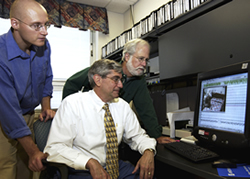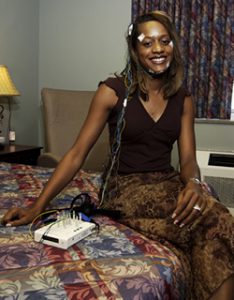UA Study Aimed at Ending Sleeping Pill Dependence
By Linda Hill

Counting sheep as a way to doze off may be a cliché, but statistics show that millions of Americans suffer from insomnia and struggle to get a good night’s sleep.
Sleep disorder researchers at The University of Alabama say having insomnia does not mean you must rely on sleeping pills. They are leading the Sleep Research Project aimed at helping people end their dependence on the pills.
Dr. Kenneth Lichstein, professor and chair of the UA psychology department, is a national expert on sleep disorders who is directing the project. Dr. Sid Nau, research scientist in the UA psychology department, is the project associate director.
Study participants will be weaned off the medication and will be helped to do this through behavior therapy, Lichstein explained.
“This is a study, rather than a clinic, and in the study we randomize people to conditions,” Lichstein says about the treatment. “The three primary treatments are sleep management training that helps individuals design their sleep pattern more efficiently, biofeedback that helps individuals assume a relaxed state of mind, and individualized, gradual sleeping pill withdrawal,” he says.
Information gained from the five-year treatment study, funded with a $2.7 million grant from the National Institute on Drug Abuse, could possibly help anyone who has ever suffered a sleepless night.
Chronic use of sleep medications can lead to “physical tolerance” (relying on more medication over time) and “diminished ability to promote sleep,” Lichstein and Nau say. Also, physical tolerance and sleep medication dependence may occur together, they note.

Additional risks associated with the long-term use of sleep medication include: drowsiness in the daytime cause by a drug carryover; higher rates of accidents or injuries requiring medical attention; higher frequency of leg fractures from accidental falls; higher frequency of motor vehicle accidents; rebound insomnia following abrupt withdrawal from sleep medications; anxiety; memory problems; and psychological dependence on sleep medications.
The UA Sleep Research Project is working with volunteers between the ages of 21-65 who frequently take prescription medicine to help them sleep and who are continuing to have frequent difficulty sleeping. Conducted by the UA psychology department and two accredited sleep disorders centers, the study hosts participants in Tuscaloosa or Birmingham. Collaborating investigators include Dr. James Geyer, medical director of the Tuscaloosa Sleep Disorders Laboratory in DCH Regional Medical Center and Dr. Robert Doekel, medical director of the Sleep Disorders Center of Alabama in Birmingham. For more information, call toll free 1-877-210-9723 or go online to www.sleepresearchproject.ua.edu.
Several UA graduate students are assisting with the project that requires participants spend time in a sleep lab in Tuscaloosa or Birmingham. A thorough sleep disorders evaluation is one of the benefits for each participant. As participants sleep, they are connected with taped on EEG electrodes that measure brain waves. EEG activity, which differs in wakefulness and in the five stages of sleep, is used to score the presence and absence of sleep and to determine the representation of stages of sleep.
Insomniacs are more likely to be female or older adults, but they can be almost anyone with 20-35 percent of the U.S. population experiencing some degree of insomnia, Lichstein says.
Some 30 million people, or around 10-15 percent of the population in this country, suffer from chronic insomnia, said Lichstein, who has served on the editorial board of a number of journals including the Journal of Consulting and Clinical Psychology,Behavior Therapy, and Sleep. The founding editor of Behavioral Sleep Medicine, Lichstein has published more than 100 journal articles and book chapters, and four books.
Among those who suffer from chronic insomnia – designated when a person has trouble falling or staying asleep three times a week for at least six months – Lichstein estimates there are about 1.5 million people who chronically use medication to help them sleep. “$1 billion a year is spent on prescription and over-the-counter sleep medications,” he notes.
The Sleep Research Project
The Sleep Research Project offers sleep tips in its Better Sleep Advice section. It includes an “Ask the Sleep Doctor” interactive question-answer feature. The public can ask questions about their sleeping problems and concerns. The informative and helpful Web site also features Better Sleep Tips and Children’s Sleep Advice.
Suggestions to promote better sleep:
- Bedtime should be fairly regular
- Limit caffeine and avoid caffeine within eight hours of bedtime
- Avoid nicotine within one hour of bedtime
- Avoid alcohol within four-six hours of bedtime
- Avoid stressful or demanding activities late in the evening
- A routine set of behaviors before bedtime can have a soothing affect
- Hunger disturbs sleep; a light bedtime snack may help
- Avoid looking at the clock when trying to sleep
- Staying in bed for a long period of time can work against you
- A consistent sleep schedule and wake time is helpful
- Naps are risky for anyone with trouble sleeping
- A steady, daily amount of exercise probably deepens sleep
- Worry about sleep is one of the main enemies of sleep
Children’s Sleep Advice
- Keep a fairly regular schedule for children’s’ bedtimes and wake times
- Be consistent in bedtime routines; in early years a bedtime story and in later years, reading or a quiet activity can serve as a cue for sleep
- From the first, encourage children to fall asleep in their own bed on their own
- Follow your own advice and pay attention to getting the amount of sleep you need to feel and function well during the day